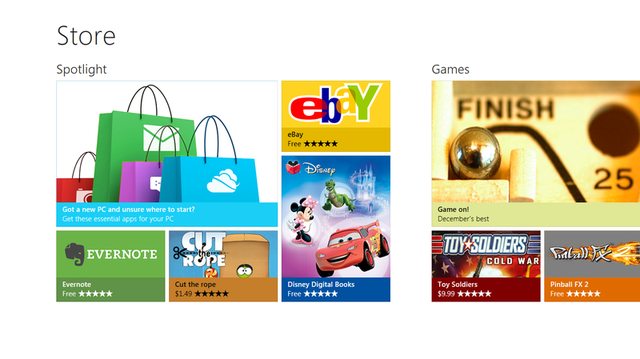
In San Francisco today, Microsoft started talking up the Windows Store, the online marketplace for Metro-style Windows 8 applications. With Apple's Mac App Store and iTunes Store already operational and selling both computer and tablet applications, Microsoft was keen to highlight the differences between its offering and Apple's. Microsoft promised to make an application store that was more flexible, more transparent, and ultimately more lucrative for developers than Apple's.
The Windows Store will support both free and paid applications, with paid applications ranging from $1.49 to $999. As with Microsoft's Windows Phone Marketplace, developers can offer free trials, with integrated support for converting trials to full versions. Microsoft will provide its own advertising and in-app purchase infrastructure, but these will be strictly optional; if a developer wants to use a different ad network, or its own subscription and billing system, that's not a problem.
Transparency has been one of the bugbears of Apple's store. Developers have been surprised when minor updates to their applications are rejected for things that haven't changed, and have struggled to gain insight into just which stage of the approvals process their applications are in. Microsoft wants to do better, with a standard validation process that developers can use even before they make their submission, and an online tracker that tells them which phase their application is in and how long they can expect the process to take.
But money is, for many developers, the most important feature of any online store. The Windows Store will take a 30 percent cut of application sales, just like Apple's store. However, if you have a major application that becomes a hit, the terms become more favorable. Once an application reaches $25,000 in revenue, Microsoft's cut drops to 20 percent. For large developers, these are better terms than Apple is offering. The terms are also better for applications with their own subscription system—Microsoft will only take a cut if you use the Microsoft system. But for small developers, the difference may not amount to much, if anything. Independent developers will at least be able to register a little more cheaply: individuals will pay $49 to register, companies pay $99.
Of course, you can't make any money if there are no users, and at the moment, Windows 8 of course has no users. Microsoft was keen to stress just how big the Windows market actually is—claiming 1.25 billion PCs total, and 500 million Windows 7 licenses shipped compared with 247 million Android devices, 152 million iOS devices, and 30 million Macs in the same period. Should Windows 8 be as big a success as Windows 7, it will rapidly become a desirable platform to target.
Windows is available worldwide, and the same will be true of the store: it will be available in 231 markets, more than 100 languages, with purchases in 58 currencies. Payments to developers will be made in any one of 31 currencies.
Microsoft will also make use of its other properties to help expose applications to buyers. Internet Explorer 10 on Windows 8 will have a special button to allow developers to link directly to their applications in the store, and applications will also show up in Bing searches. This is in addition to standard application store functionality like top ten lists.
The company also described enterprise store features. Access to the store can be removed or restricted by IT administrators, and enterprises can deploy their own Metro-style applications without going through the store.
Finally, Microsoft announced that the store would become available concurrently with the release of the Windows 8 beta—and that's currently scheduled for late February. Microsoft has described the Windows 8 development process as similar to that of Windows 7, with a preview release, a single beta, and then a single release candidate, instead of the multiple betas and release candidates seen with previous Windows releases. This may be so, but the February release hints that the major Windows 8 release is taking a bit longer than Windows 7 did; the Windows 7 beta was released in early Januaury at CES 2009.
Listing image by Image courtesy of Microsoft
reader comments
129